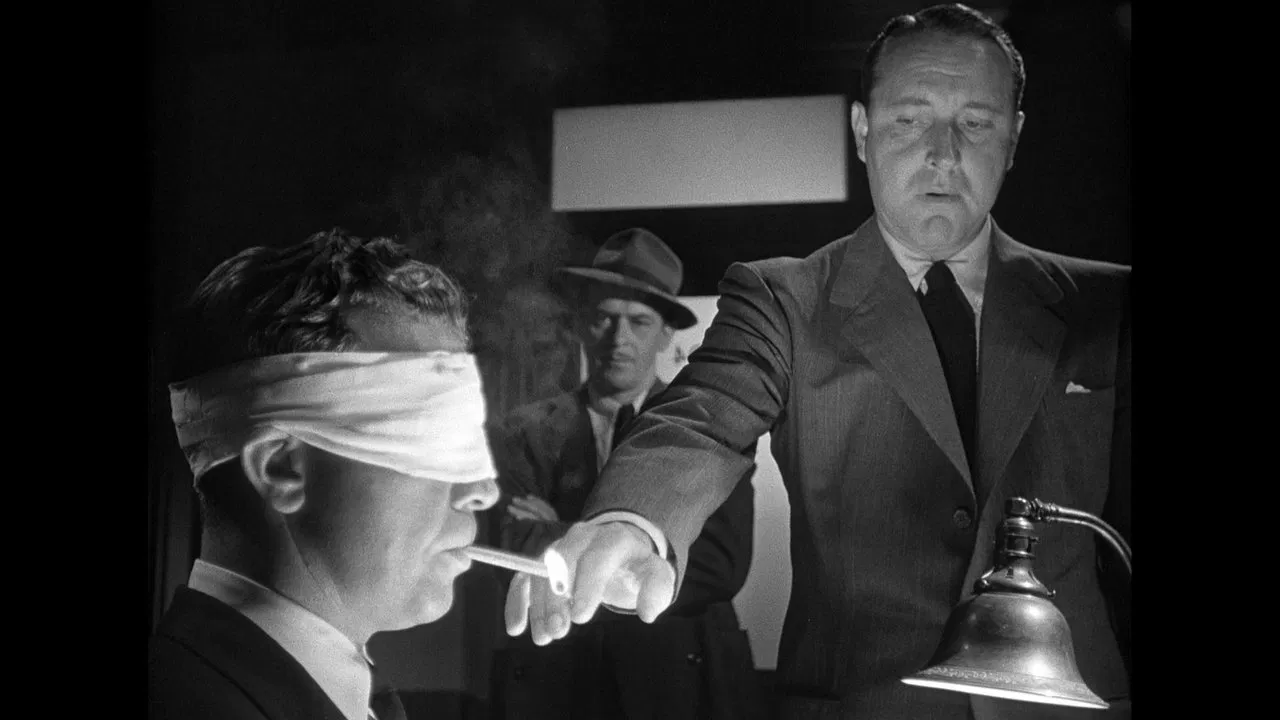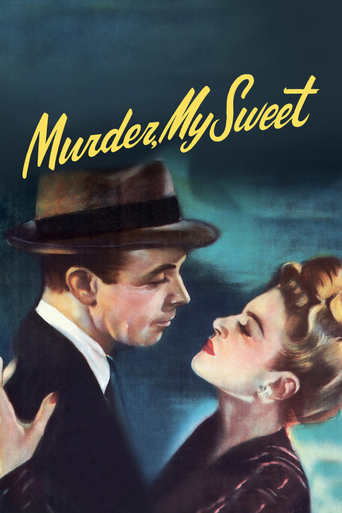

Late in 1944, when Raymond Chandler's popularity and critical esteem were at their height, RKO seized the opportunity to dust off their song-bought "Farewell, My Lovely" and film it straight. They couldn't resist changing the title to "Murder, My Sweet", but otherwise this is pretty well as authentic as Chandler ever got on the screen. Marlowe, for instance, was sensationally played by Dick Powell who, sick to death of his namby-pamby screen image as a lightweight crooner, talked the studio into re-inventing him as the tough, resilient, cynical private eye - a role that he was to play with minor variations and only one or two exceptions for the rest of his acting career. Powerfully directed by Edward Dmytryk, the movie not only won the Edgar Award for Best Mystery of the Year, but took millions at the box-office. Twelve years later, Chandler himself declared that Dick Powell deserved recognition as the nearest cinematic equivalent of Marlowe and that "Murder, My Sweet" was the best screen adaptation of any of his novels. (Available on a 10/10 Warner DVD).
... View MoreMurder My Sweet (1944) may not be the best or hardest-hitting film noir, but it is certainly dripping with classic noir imagery and tropes. It has everything the modern public associates with the genre/style/whatever you think it is: a snarky and cynical private eye, a duplicitous femme fatale, lost loves, claustrophobic sets drenched in shadows, voice-over narration, bizarre villains, the works.Chandler's Marlowe stories are more about atmosphere and the main character than delivering a great plot. Murder My Sweet does well on both counts. The atmosphere is charged with malevolence, making Bay City and LA look like urban hellscapes populated by criminals and corruption. The chiaroscuro lighting dominates every scene, lending the movie a nightmarish quality that culminates in a bizarre drug-induced hallucination sequence. And then there's Dick Powell as Marlowe. Though Bogart, Montgomery, and Mitchum did well with the part, Dick Powell is the best Philip Marlowe. He's cynical, yet strangely chivalrous. He's hardboiled, yet occasionally vulnerable. He's fantastic and I wish he'd been able to play the role in other movies.The ending is a bit too optimistic for my tastes, as the gloom and dread which pervaded it are so strong, but for its style and Powell alone, I consider this film one of the great classics of noir.
... View MoreEdward Dmytryk directed this first adaptation of author Raymond Chandler's classic private detective character Philip Marlowe(soon to be made even more famous by Humphrey Bogart in the Howard Hawks directed "The Big Sleep"). Here, Dick Powell plays Marlowe in a typically complex case that will put him in mortal danger(and confusion). Marlowe is hired by recently released ex-convict Moose Malloy(played by Mike Mazurki) to find his girlfriend Velma(played by Claire Trevor) whom he hasn't seen in several years, and still loves. The case will not be as simple or as straight-forward as it first appears... Powell is fine as Marlowe, with good direction and reasonably intriguing story.
... View More"Murder, My Sweet" is first proper adaptation of a Raymond Chandler novel featuring legendary detective Philip Marlowe. Title was changed from "Farewell, My Lovely" because it sounded like another lighthearted Dick Powell musical.Speaking of Powell, I was not aware of his matinée idol image prior to doing this film. I haven't seen him in anything else, though as the director of the WWII submarine drama "The Enemy Below", he left a good impression on me. But I admit that I was skeptical. I cannot be blamed for being so because my idea of a perfect Marlowe is Bogart's portrayal of him in "The Big Sleep". I had my doubts whether Powell could match up to it. So you can imagine my pleasant surprise when it turned out that he did have it in him to match Bogart. Maybe he wasn't as outwardly tough but he definitely nailed it in the clinic scenes where he is in a drugged state and then coming out of it. I felt that he gave Marlowe a vulnerable and hence relatable edge.I don't like the novel much. It has the expected hardboiled dialogue but I could not bring myself to care about any of the characters or the mystery, unlike The Big Sleep. Many fans of the novel crib on this film's board about the changes it made to the novel but I think that at least a few of them were for the better. I liked that the role of Grayle's aged husband was enlarged. It injected some genuine emotion in the film which otherwise might have ended up being another cold exercise in mystery solving. It also suited me better that instead of Marlowe stumbling into a mystery by accident, he was expressly hired by Moose Malloy to solve it.Even if he is working on a low budget, Dmytryk employs a lot of interesting gimmicks and tricks to make the film interesting to look at. I loved the way Moose Malloy was introduced as an ominous reflection in the window. The design of the drug trip/withdrawal scene in the clinic had to be believable for it to work and it is certainly a striking feature, but my most memorable single image in the film would be the perfect match cut when Marlowe holds Marriott's driving licence in his hand and then it cuts to the same card in the hands of a detective.And before I forget, Mike Mazurki was simply awesome in his role as the soft-hearted toughie Moose Malloy. He perfectly managed to make his character look dimwitted and menacing simultaneously.
... View More